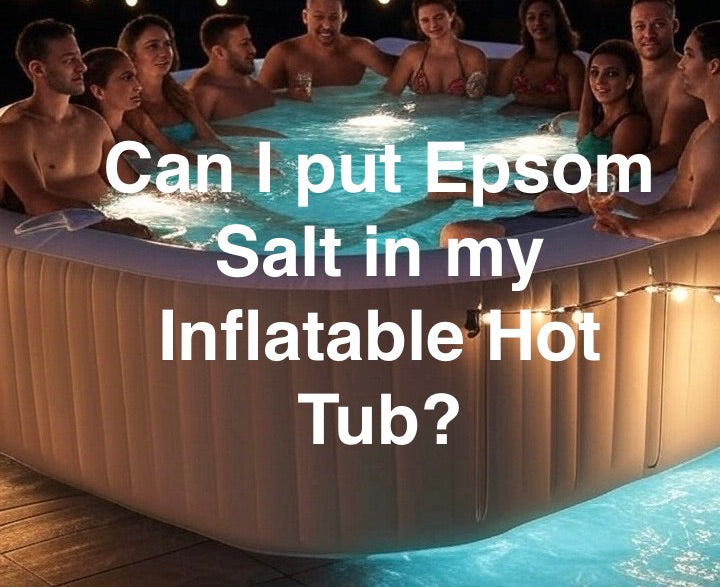
Can I Put Epsom Salt in My Inflatable Hot Tub?
Ever thought about sprinkling a bit of Epsom salt into your inflatable spa for that extra touch of luxury? It sounds tempting—after all, who doesn’t love the idea of melting away stress in magnesium-rich water.
The short answer? Best not. Epsom salt might work wonders in your bath, but it can spell trouble for inflatable hot tubs. Stick with me, and I’ll explain why it’s risky, what the safe alternatives are, and how to keep your spa in top condition without voiding your warranty.
The Short Answer: Is it Safe?

When it comes to inflatable spas, manufacturers are pretty clear—Epsom salt isn’t recommended. The problem isn’t the salt itself, but how it interacts with the materials and mechanics of your spa.
Why Inflatable Hot Tub Manufacturers Advise Against It
PVC and vinyl, the stuff most inflatables are made of, don’t play nicely with salts. Pop Epsom salt in, and you could be waving goodbye to your warranty.
Potential Risks to the Pump, Heater, and Filter
Imagine pouring sugar into your kettle—it wouldn’t end well. That’s what salts can do to your hot tub’s pump and heater. They can clog filters, reduce efficiency, and even cause parts to fail.
How Epsom Salt Can Affect the Hot Tub Liner
Undissolved crystals can scratch the liner or weaken the material over time. One tiny tear, and suddenly you’re bailing water out of the garden instead of soaking in it.
Understanding Why Epsom Salt is Problematic for Inflatable Hot Tubs
Chemical Composition of Epsom Salt
Epsom salt is just magnesium sulfate. Harmless in your bath, but in a hot tub it doesn’t just dissolve and disappear—it lingers.
How Magnesium Sulfate Interacts with Hot Tub Components
Magnesium can upset your water balance, making it harder to keep your spa clean and safe. It also reacts differently with chlorine and bromine, so you’ll spend more time fiddling with chemicals than relaxing.
The Risk of Clogging and Corrosion
Over time, salt deposits can build up. Think of limescale in a kettle, but inside your pump and pipes. That means clogs, corrosion, and an unhappy spa.
Alternatives to Epsom Salt for a Relaxing Soak
So, what can you do if you want a spa that feels like a treat but without the risks?
Hot Tub-Safe Spa Salts
The good news is, there are salts made just for hot tubs. They dissolve properly, won’t wreck your liner, and still give you that luxury soak.
Aromatherapy Solutions
Hot tub aromatherapy crystals and liquids are brilliant. They add calming scents—lavender, eucalyptus, citrus—without messing up your filters or water chemistry.
Creating a Relaxing Environment without Additives
Sometimes the simplest touches make the biggest difference. Soft garden lights, a Bluetooth speaker with chilled music, and maybe even a pergola for privacy—no chemicals needed.
How to Clean and Maintain Your Inflatable Hot Tub

The Importance of Regular Cleaning
Here’s the truth: the better you clean your spa, the less trouble you’ll have later. Regular cleaning keeps the water safe and the tub lasting longer.
Recommended Cleaning Schedule
Aim to drain and clean every 4–6 weeks, depending on how often you use it. Families using it nightly? Closer to four.
Steps for Draining and Refilling Your Hot Tub
Switch off the power, drain completely, give the liner a gentle scrub, rinse it down, and then refill with fresh water. Simple but effective.
Using Proper Hot Tub Cleaning Solutions
Stick with spa-safe products. It’s tempting to grab the washing-up liquid, but it’ll only create foam, residue, and headaches.
Maintaining Proper Water Chemistry
Testing Water pH and Alkalinity
Test strips are your best friend. Check 2–3 times a week and keep levels balanced—it takes minutes but saves hours of fixing problems later.
The Role of Sanitizers
Chlorine and bromine are still the heroes here. They keep bacteria under control and water safe for everyone.
Troubleshooting Common Water Problems
If the water looks cloudy or smells odd, don’t panic. It usually means your pH or sanitiser levels are off—quick adjustments get things back on track.
Related Questions
Common Additives and What to Avoid
Can I Use Bubble Bath or Soap in My Hot Tub?
Sadly not. Soap creates foam mountains, clogs filters, and leaves you scrubbing instead of soaking. Keep the bubble bath in the bathroom.
What About Essential Oils?
Lovely in a diffuser, but not in your spa. Oils stick to the liner, mess with filters, and cause more cleaning than they’re worth.
The Difference Between Epsom Salt and Hot Tub-Specific Spa Salts
Epsom salt is for baths. Hot tub salts are specially formulated to dissolve safely and keep your water balanced. That’s the difference between a spa that lasts and one that doesn’t.
Key Takeaways
-
Epsom salt is brilliant for baths but risky for inflatable spas.
-
Salts can damage pumps, liners, and filters—often voiding warranties.
-
Safe alternatives include spa-specific salts and aromatherapy products.
-
Regular cleaning and balanced water chemistry are key to long spa life.
-
Avoid soap, oils, and anything not labelled as spa-safe.
Conclusion
So, can you put Epsom salt in your inflatable hot tub? Technically, yes. But should you? Not if you value your spa, your warranty, and your Saturday evening soak.
Inflatable spas are meant to be easy, relaxing, and family-friendly. A few clever alternatives—like spa-safe salts, scents, and a cosy set-up—give you the same calming benefits without the repair bills.
Do it right, and your inflatable spa will stay your little slice of garden paradise for years to come.
Have you checked out our other posts?
Is 10 Years Old Too Young For A Hot Tub?
Can You Put Pool Shock In An Inflatable Hot Tub?
Is Bromine Better Than Chlorine For Hot Tubs?
Do I Need Chlorine In An Inflatable Hot Tub?
Can You Use Saltwater In An Inflatable Hot Tub?



Leave a comment